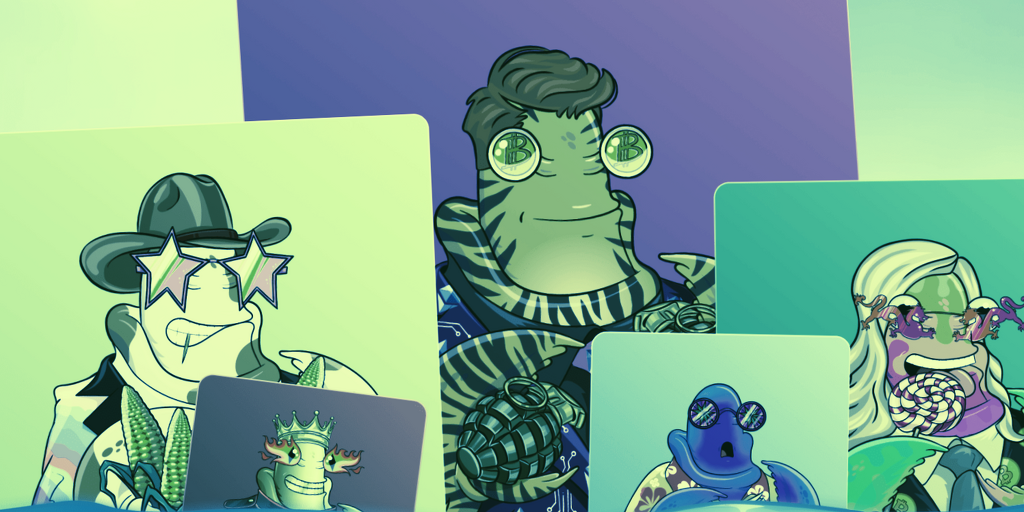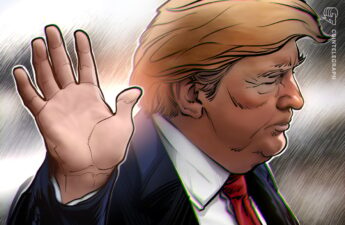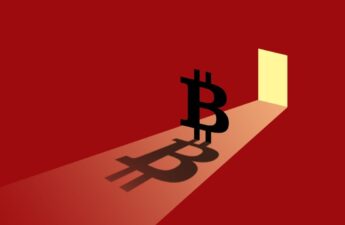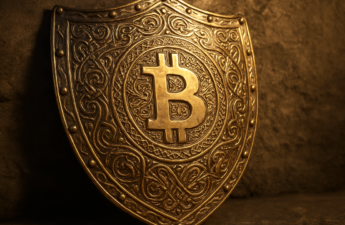This story comes out of PubDAO, a decentralized news wire.
NFT collectibles can rapidly create communities around a shared interestor a cause. And the most pressing cause in cryptoland recently has been preparation for increased U.S. government regulation. Thats why one group took the millions of dollars it earned from NFT sales last month and gave it to a key crypto industry voice in Washington, D.C.
The group was Universe.xyz, a DAO for launching NFT projects, and the NFTs were Lobby Lobsters, a series of 10,000 cartoon lobsters minted on the Ethereum blockchain.
We wanted to do something good, and it was just perfect timing, says Universe head of operations Mark Ward. Everyone was talking about it.
Back in August, industry advocates mobilized to fight what many saw as a threat to the future of crypto in the United States: the $1 trillion infrastructure bill proposed in the U.S. Senate that included a provision about crypto tax reporting. Some believed the broad language defining brokers could stifle Americas ability to compete on the global crypto stage.
Despite efforts by crypto industry lobbying groups like Coin Center and the Blockchain Association, proposed revisions to the bills language were not accepted. Still, the conflict lit a spark in the crypto scene.
It is abundantly clear that increased regulatory scrutiny of the U.S. crypto industry is on the way. While many crypto companies and investors fear the impact of regulators, others welcome clarity and guidancebut want to educate lawmakers on the confusing and rapidly-evolving frontier of decentralized finance (DeFi). When the next regulatory skirmish erupts, it could come down to the efforts of DAOs (decentralized autonomous organizations) to spur action, and raising political donations through the sale of NFTs might be the route to do it.
An NFT (non-fungible token) is like a receipt that proves ownership of a unique digital item. In the case of Lobby Lobsters, its a whimsical illustration of a lobster in a suit, each with a different mix of attributes and accessories.
Randomized profile pictures (or avatars) have been one of the biggest drivers of this years NFT market boom, which yielded $10.7 billion of trading volume in Q3 2021 alone. CryptoPunks and Bored Ape Yacht Club NFTs routinely sell for hundreds of thousands of dollars apiece (or more), and act as a membership card into an exclusive community of collectors.
Lobby Lobsters, on the other hand, debuted at only 0.1 ETH apieceabout $400 a popon first sale, with all proceeds set to be donated to benefit crypto advocacy. The idea originally spun out of a Twitter conversation between Uniswap creator Hayden Adams and Synthetix founder Kain Warwick about the potential to raise funds for lobbying by selling NFTs.
Universe, an Ethereum NFT marketplace project, took the lead on bringing the concept to life. The Universe team had previously launched another NFT collection called Polymorphs, and tasked its artists and engineers to design and launch Lobby Lobsters within a matter of weeks.
Barely a month after that original Twitter discussion, Lobby Lobsters went on sale on September 5, and the 10,000 NFT images sold out in 30 minutes. The sale generated 1,000 ETH, which was worth nearly $4 million at the time of the sale. All of the funds would ultimately be donated, with no cut taken by the creators for their efforts.
Universe is governed by a DAO community, so to formally complete the transfer of the raised funds to an as-yet-unspecified non-profit organization, a governance proposal had to be drafted and submitted to the communityand members would have to vote with their XYZ tokens.
Created on September 7, the DAO proposal suggested that the entire 1,000 ETH bounty be sent to Coin Center, the Washington-based research and advocacy group. When voting took place soon thereafter, the result was unanimous: 100% of the DAO votes went in favor of the proposal. The community was completely aligned, Ward says.
It is the single largest donation that Coin Center has ever received.
Given CoinCenters annual budget of $1.3 million at the time of donation, the Lobby Lobster funds represent up to three years worth of funding at that level. That’s huge, says Coin Center comms director Neeraj Agrawal. Obviously, it’s a massive increase to our runway.
The funds allow Coin Center increased flexibility to expand to meet the growing and evolving needs of crypto advocacy in the United States.
It has become clear that some of the challenges that we have with policy may have to be resolved in the courts, says Agrawal. It’s really good for us to have this kind of war chest to fight those fights as they appear, and to make sure that we have the ability to hire new talent as it becomes available.
Universe plans to explore the Lobby Lobsters project even further in the future, including diverting royalties from secondary market saleswhen owners resell the NFTsto support other crypto advocacy efforts. The team may also create additional utility or perks around ownership, and is considering spinning out a separate DAO community focused on crypto lobbying initiatives.
Its a really good feeling to know that we’re making a difference and giving runway to the people who are out there fighting for us, and don’t even really know us, says Ward. They’re working all day and all night, doing their day jobs for crypto anons Theyre badass at heart.
Lobby Lobsters may have also influenced other NFT projects that followed, such as the Solana-based Tungsten Cube NFT project. Recently launched, it has already raised more than $235,000 worth of SOL to donate to crypto advocacy groups, Coin Center included.
Agrawal says that the non-profit had not considered the idea of DAO-driven donations before Lobby Lobsters launched, but now sees it as a viable option to ensure that the group is prepared for potential regulatory battles ahead. Coin Center could even sell its own NFTs to DAO communities, he says, effectively giving them a way to donate to the organization.
Call it crypto-native fundraising, he says.




